We ask you, urgently: don’t scroll past this
Dear readers, Catholic Online was de-platformed by Shopify for our pro-life beliefs. They shut down our Catholic Online, Catholic Online School, Prayer Candles, and Catholic Online Learning Resources—essential faith tools serving over 1.4 million students and millions of families worldwide. Our founders, now in their 70's, just gave their entire life savings to protect this mission. But fewer than 2% of readers donate. If everyone gave just $5, the cost of a coffee, we could rebuild stronger and keep Catholic education free for all. Stand with us in faith. Thank you.Help Now >
Part 5: Feast of the Epiphany
"Arise, for Thy Light Is Come"
Be enlightened, be enlightened, O Jerusalem, for thy light is come, and the glory of the Lord is risen upon thee, Jesus Christ, born of the Virgin Mary.
--Theme Song for the Feast of the Epiphany taken from the Lesson, Epiphany Mass.
THE MEANING OF EPIPHANY
For many years in the English speaking world the feast of Epiphany has been overshadowed by that of Christmas. But unless we realize the significance of this great day, we see only one side of the mystery of the Incarnation. Now after contemplating the staggering fact that God has become a human child, we turn to look at this mystery from the opposite angle and realize that this seemingly helpless Child is, in fact, the omnipotent God, the King and Ruler of the universe. The feast of Christ's divinity completes the feast of His humanity. It fulfills all our Advent longing for the King "who is come with great power and majesty." We see that whereas Christmas is the family feast of Christianity, Epiphany is the great "world feast of the Catholic Church."
Epiphany is a complex feast. Originating in the Eastern Church and formed by the mentality of a people whose thought processes differ sharply from our own, the Epiphany is like a rich Oriental tapestry in which the various themes are woven and interwoven-- now to be seen in their historical setting, again to be viewed from a different vantage point in their deep mystical significance. In this brief introduction four of the main ideas of the Epiphany will be outlined.
Divine manifestation: The Epiphany takes its name from the Greek "epiphania," which denotes the visit of a god to earth. The first idea of the feast is the manifestation of Christ as the Son of God. "Begotten before the daystar and before all ages, the Lord our Savior is this day made manifest to the world." The feast unites three events in the life of Christ when His divinity, as it were, shines through His humanity: the adoration of the Magi; the baptism of Christ in the Jordan; and the first miracle at the wedding feast of Cana. Moreover, at Epiphany the Church looks forward to the majestic coming of Christ on the "youngest day" when His manifestation as God will be complete. The Gospels of the baptism and the marriage at Cana are read on the Octave Day and the Second Sunday after Epiphany, and later Sunday masses in the Epiphany season continue to show the divine power of our Lord in some of His most striking miracles.
Royal kingship: A second important idea in Epiphany is the extension of Christ's kingship to the whole world. The revelation of Christ to the three kings at Bethlehem is a symbol of His revelation to the whole of the Gentile world. Epiphany presents to us the calling of not merely a chosen few, but all nations to Christianity.
Your Light is Come: Closely linked to both these themes of divine manifestation and world kingship is a third idea running through the Epiphany feast: that of light. During Advent, the world was in darkness, and we prayed and waited in the spirit of the Jewish nation which lived in expectation of the Coming Light during thousands of years. At Christmas the Light shone forth, but dimly, seen only by a few around the crib: Mary and Joseph and the shepherds. But at Epiphany the Light bursts forth to all nations and the prophecy is fulfilled: "The Gentiles shall walk in Thy light, and kings in the brightness of Thy rising." The mysterious star of Epiphany, "flashing like a flame," is still another facet of the light-motif, a symbol capable of being interpreted in a dozen different ways.
How much food for thought and reflection is contained in just these three ideas, and what a significance they have for our own time! Epiphany lifts our eyes from the family celebrations and demands that we should include in our vision "all the ends of the earth." It demands that, like the three wise men, we should have the courage to follow the light of the star we have seen, however hazardous the journey; that the light of our faith, like that of the wise men, should be so strong that we are able to see and recognize our Lord and Ruler in however unexpected a way He may present Himself to us; and that having recognized Him, we should bow down and adore Him, offering Him our total loyalty.
Moreover, Epiphany demands that like these kings we should return to our own countries a different way, carrying to all those we meet the light of Christ. "For behold, darkness shall cover the earth," says the Epistle of the Epiphany Mass, "and a mist the people: but the Lord shall arise upon Thee, and His glory shall be seen upon Thee. And the Gentiles shall walk in Thy light..." These words may be applied to us, upon whom the light of Christ has indeed risen, and who have the responsibility to radiate that light in the darkness of our own world. It is clear how much the feast of Epiphany must mean to all who are engaged in the apostolate and are striving to extend the kingdom of Christ.
The royal nuptials: Besides the important ideas outlined above, there is still another great theme threaded through the Epiphany feast--the theme of the royal nuptials, the wedding of Christ with humanity. It is an idea on a completely different level from the historical events which the Epiphany celebrates, yet inextricably bound up with them; for example, the historical marriage feast of Cana is used by the Church to suggest the setting for Christ's nuptials with the Church; the wise men represent not only the three Persian Magi adoring the Babe 2000 years ago at Bethlehem, but also the Gentile world hurrying to the wedding feast at the end of time when mankind's nuptials with the divine Bridegroom will be celebrated; the gold, frankincense and myrrh are not only tokens for the little Baby King in the stable, but royal wedding gifts for the mystical marriage feast of heaven.
The Epiphany antiphon for the hour of Lauds brings out strikingly this theme of the divine marriage of Christ with humanity, and at the same time shows the deep mystical significance behind the historical events surrounding the feast. Perhaps nowhere more clearly than in this antiphon do we see that on Epiphany we do not commemorate a set of historical facts as much as we celebrate a great mystery: "This day the Church is joined to her heavenly Spouse, for Christ has cleansed her crimes in the Jordan. With gifts the Magi hasten to the royal nuptials, and the guests are gladdened with wine made from water."
EPIPHANY IN THE PARISH
THE EPIPHANY MASS
Of course, the very center and focal point of the celebration must be the Mass--and what a glorious Mass today's is! We are almost overwhelmed by the majesty, the brilliance, power and dominion of our King, to whom "the kings of Tharsis and the islands, of Saba and Arabia" are offering gifts. We feel that we ourselves are taking part in the fulfillment of the prophecy, "The Gentiles shall walk in Thy light and kings in the brightness of Thy rising."
If any Mass in the whole year should be celebrated with all possible magnificence, with music and incense, it is surely today's. And it is especially appropriate to have a beautiful Missa Cantata in the parish with representatives of every family present. Perhaps some active young people can assist the pastor in encouraging a good attendance at a High Mass, and they might also gather together a group to rehearse the singing. Copies of the "Laudate Dominum" with the antiphon, "Christus vincet; Christus regnat; Christus imperat," could be mimeographed so that the entire congregation can join in singing praise to Christ.
The Epiphany Mass is like a great offertory procession, led by the three Magi. This fact is emphasized in some parishes with a special procession before Mass. Three representatives of the parish bring up gold, frankincense and myrrh, together with the bread and wine for the Offertory, while the choir chants special antiphons from the Epiphany liturgy. (The gold can be represented by gifts of old jewelry from parishioners, which can later be sold for the benefit of the poor.)
At the altar, the gifts are presented to the officiating priest, who may then read over them the special blessing the Church gives for gold, incense and myrrh on this feast day (contained in Father Weller's English translation of the Roman Ritual, published by Bruce, Milwaukee, Wisconsin). Such a procession can help all the people enter more fully into an understanding of the Epiphany mystery, and its theme of offering adoration and praise to God.
Because Epiphany falls on a weekday most of the time, it may not be possible to arrange such a celebration in the parish--but in school or college it should not be difficult to cooperate with school authorities in planning a special observance of the Epiphany feast, beginning with a sung High Mass in the morning.
But even if we cannot participate in a High or Sung Mass before hurrying off to work or school, at least we can read through the texts of the Mass the evening before, so that our minds and hearts are suffused with the splendor of the feast and its rich and deep significance for our life and work in the apostolate.
THE CRIB ENTHRONED
Throughout the days after Christmas the crib has remained set up in the parish Church--or in the family living room, or meeting place of the apostolic group--to center the thoughts of all on the humble birth of the Child at Bethlehem. Now on the feast of Epiphany the crib is transformed into a royal throne, so that all who see it are reminded of Epiphany's message: "Behold, the Lord, the Ruler is come: and the Kingdom is in His hand, and power and dominion."
The decorating of the crib on the Eve of Epiphany is a wonderful project for a parish young peoples' group or for the family. An elaborate cloth of gold or red velvet lines the crib. Upon the head of the Christ-Child is placed a kingly crown and in His hand a golden sceptre. Around the crib are placed golden candlesticks with tall candles that burn during the Epiphany Mass, or in the case of the home crib, at family prayers. Thus with few changes the crib becomes a regal throne, the little Child, a King. The contrast between the peaceful coming at Christmas and the triumphant world manifestation at Epiphany is eloquently expressed. This simple custom does much to make the spirit of Epiphany live in parish and family.
BLESSING OF EPIPHANY WATER AND CHALK
Some of the Fathers of the Church held the opinion that through His baptism Christ hallowed all the waters of the earth; therefore it became traditional to bless water on the vigil of Epiphany. This water was used in the blessing of homes on the following day.
This custom is being revived today in some parishes. The people gather in the Church on the eve of Epiphany to prepare for the coming feast and to take part in the ceremony of the blessing of the water. Perhaps as a special project children in the classroom or some other group in the parish could prepare holy water containers for the parishioners, decorating small bottles with Epiphany symbols and texts in enamel paint. Then each family could take home one of these filled with the blessed water to use on the following day.
Many pastors also bless pieces of chalk for each family to use in inscribing the names of the three Magi over their doorways, as a manifestation of their Christian faith and a protection against the powers of evil. The prayer for the blessing of the chalk is as follows:
O Lord God, bless this Thy creature chalk that it may be used for the salvation of the human race. Through the invocation of Thy most Holy Name grant that whoever shall take of this chalk and write with it upon the doors of his house the names of Thy saints, Caspar, Melchior and Balthasar, may through their merits and intercession receive health of body and protection of soul. Through Christ our Lord. Amen.
The blessing of water on the vigil of the Epiphany could well be performed with full solemnity before the main altar. If this is not possible and no priest is available, the prayers and hymns might be used as a vigil preparation at home. The full text for the blessing may be found in Volume three of Father Weller's English translation of the Roman Ritual.
The liturgy of Epiphany, in all its regal splendor, can be a powerful force in educating we modern day Americans in the real meaning of the Incarnation. If we are looking for a remedy for the sentimentality of our business-dominated celebration of Christmas, it is in the Epiphany Mass and Office and in a full observance of the feast that we shall find it.
EPIPHANY IN THE HOME
BLESSING OF THE HOME
>From the altar the blessing of the Church extends itself on Epiphany to the homes of the faithful. The custom of blessing the home probably grew up on account of the words in the Gospel, "And entering into the house, they found the Child with Mary, His Mother, and falling down they adored Him." The priest blesses the house if he can be present, but if not, the father of the family may do so. He leads the family (and any guests who may have been invited for the occasion) from room to room, blessing each and inscribing the initials of the three Magi above the doors with the chalk that has been previously blessed. The chalk blessing is written as follows:
19 + C + M + B + 55
One small boy was so delighted with the ceremony that the first time his home was blessed, he said, "Oh, Daddy, is it all over?"- -and then the bright idea struck--"Couldn't we bless all the closets, too?"
A full account of the ceremony and prayers in English are given below. When we bless the houses at Grailville, copies are mimeographed for everyone present so that they can join in the prayers and singing. The house blessing for Epiphany is a beautiful custom for families, and also for schools and apostolic groups to revive, because it helps strengthen the bond of union which should exist between altar and home.
THE BLESSING
On entering the home,
LEADER (Priest, if present, or father of the family):
Peace be to this house.
ALL: And to all who dwell herein.
ALL: From the east came the Magi to Bethlehem to adore the Lord; and opening their treasures they offered precious gifts: gold for the great King, incense for the true God, and myrrh in symbol of His burial.
ALL PRAY: The Magnificat.
During the Magnificat, the room is sprinkled with holy water and incensed. After this is completed,
ALL: From the east came the Magi to Bethlehem to adore the Lord; and opening their treasures they offered precious gifts: gold for the great King, incense for the true God, and myrrh in symbol of His burial.
LEADER: Our Father...And lead us not into temptation
ALL: But deliver us from evil.
LEADER: All they from Saba shall come
ALL: Bringing gold and frankincense.
LEADER: O Lord, hear my prayer.
ALL: And let my cry come to You.
LEADER: Let us pray. O God, who by the guidance of a star didst on this day manifest Thine only-begotten Son to the Gentiles, mercifully grant that we who know Thee by faith may also attain the vision of Thy glorious majesty. Through Christ our Lord.
ALL: Amen.
LEADER: Be enlightened, be enlightened, O Jerusalem, for thy light is come, and the glory of the Lord is risen upon thee-- Jesus Christ born of the Virgin Mary.
ALL: And the Gentiles shall walk in thy light and kings in the splendor of thy rising, and the glory of the Lord has risen upon thee.
LEADER: Let us pray. Bless, O Lord God almighty, this home, that in it there may be health, purity, the strength of victory, humility, goodness and mercy, the fulfillment of Thy law, the thanksgiving to God the Father and to the Son and to the Holy Spirit. And may this blessing remain upon this home and upon all who dwell herein. Through Christ our Lord.
ALL: Amen.
After the prayers of the blessing are recited, each room of the home is sprinkled with Epiphany water and incensed. The initials of the Magi are inscribed upon the doors with the blessed chalk.
A CHILDREN'S PARTY FOR TWELFTH NIGHT
The first idea that our celebrations within the family should try to make vivid for the children is the visit of the three Magi. These are such fascinating and mysterious figures, and the whole episode is so dramatic that there are numerous ways in which this can be done. Many families these days give an Epiphany or "Twelfth Night" party at which the traditional dessert is a cake, containing three beans or large nuts. The three people who find the beans in their piece of cake, are hailed as the "Wise Men" and immediately don the most gorgeous robes available. Colorful old drapes become exotic regal apparel, and fine crowns are fashioned from such prosaic materials as round oatmeal boxes covered with aluminum foil. After that the "kings" rule the party for the rest of the afternoon or evening. They choose the games, supervise the refreshments and may demand special favors from their subjects. It may be added that it is important that the hostess plans a program beforehand, especially in the case of small children. Simple place cards with texts from the Epiphany Mass, and meal prayers which include the Epiphany collect, aid in carrying out the theme.
PROCESSION TO THE ROYAL CRIB
Most important of the offices the three party Magi perform is the bearing of the figures of the three Wise Men on the last stage of their journey which started on Christmas and which ends today, as they find the Child in the crib. The whole party can be made far more meaningful for the children if this is carried out with reverence and solemnity.
First, the children help "enthrone" the Christ-Child as described earlier. Then all the children form in a procession, with the three live Magi in the lead, each bearing the statue whom he represents. The carol, "We Three Kings of Orient Are" provides just the right rhythm for a royal procession, and if the kings happen to be singers, each sings the verse about his particular gift.
After the figures are in position, the rest of the children have an opportunity to offer gifts. If they have not already had a chance to give material gifts to the poor, this would be a suitable time to do it. But if the children have already done this on a previous occasion, they can begin to learn what it means to give something of themselves for the service of Christ. First, the mother explains to the children that the gold means love; the frankincense, prayer; and the myrrh, suffering and mortification. Then she makes a few definite suggestions, and each child writes on a slip of paper a promise to do one act of this kind. For example, "I will say an extra Hail Mary every day for the next week for an African child my own age who has never heard of Christ," or "I will let my sister play with my new doll dishes." The pieces of paper are laid at the feet of the Christ-Child during the procession.
It also helps the children to realize the scope of Christ's kingdom if each one chooses as his own "kingdom" a different country. As they do their homage to the Christ-Child, the children tell Him where they come from--and then they pray for that particular country very especially during the octave of the Epiphany feast.
After the procession, the children gather round the crib, and two of the older ones read alternate verses of a psalm as a concluding prayer.
ALL PRAY: From the East came the Magi to Bethlehem to adore the Lord; and opening their treasures they offered precious gifts: gold for the great King, incense for the true God, and myrrh in symbol of His burial.
1ST CHILD: May he rule from sea to sea, * and from the river to the ends of the earth.
2ND CHILD: His foes shall bow before him, * and his enemies shall lick the dust.
1ST CHILD: The kings of Tharsis and the Isles shall offer gifts; * the kings of Arabia and Saba shall bring tribute.
2ND CHILD: All kings shall pay him homage, * all nations shall serve him.
For he shall rescue the poor man when he cries out, * and the afflicted when he has no one to help him.
He shall have pity for the lowly and the poor; * the lives of the poor he shall save.
From fraud and violence he shall redeem them, * and precious shall their blood be in his sight.
May he live to be given the gold of Arabia, and to be prayed for continually * day by day shall they bless him.
May there be an abundance of grain upon the earth; on the tops of the mountains the crops shall rustle like Lebanon; * the city dwellers shall flourish like the verdure of the fields.
May his Name be blessed forever; * as long as the sun his Name shall remain.
In him shall all the tribes of the earth be blessed; * all the nations shall proclaim his happiness.
Blessed be the Lord, the God of Israel who alone does wondrous deeds.
And blessed forever be his glorious Name; * may the whole earth be filled with his glory.
Glory be to the Father and to the Son * and to the Holy Spirit.
As it was in the beginning, is now and ever shall be, * world without end. Amen.
ALL: From the East came the Magi to Bethlehem to adore the Lord; and opening their treasures they offered precious gifts: gold for the great King, incense for the true God, and myrrh in symbol of His burial.
YOUNG HOST or HOSTESS reads the Gospel for the feast of Epiphany.
ALL: Praise be to You, O Christ.
The mother or father then gives a short explanation of the "Our Father" as the great missionary prayer, reminding the children particularly of the meaning of the words, "Thy Kingdom come."
ALL PRAY: Our Father, who art in heaven, Hallowed be Thy Name; Thy Kingdom come: Thy Will be done On earth as it is in heaven. Give us this day our daily bread And forgive us our trespasses, as we forgive those who trespass against us. And lead us not into temptation, But deliver us from evil. Amen.
Since this is the last of the "Twelve Days of Christmas" it would be especially appropriate to end with carol singing around the royal throne.
Needless to say, the Twelfth Night Party is not essential for this simple re-enactment of the coming of the Wise Men; it could easily be done just within the family circle and the parents could give suitable tasks to the children.
EPIPHANY PLAYS FOR THE FAMILY AND COMMUNITY
As far back as the twelfth century, Epiphany seems to have been the traditional time for plays, and indeed it is not surprising that this should be so. Apart from the boundless dramatic possibilities in the Epiphany theme, the drama has always been one of the best mediums for conveying ideas, and therefore it is very fitting that we should use it to carry the light of Christ to those who are still in darkness.
The first Epiphany plays were done in church and were based on the Gospel narrative--but gradually they grew wider and wider in scope. In the same way, more ambitious families could extend the simple processions suggested for the Twelfth Night party into real plays to be acted for an audience. A mother who could find the time to help the children of several families, a parish group or a scout troop. write and produce such a play to be performed on the 6th of January, would be doing an apostolic service to the whole community. Such a play could be performed either in a home for children, in a children's ward in the local hospital, in a family where the children might not be celebrating Epiphany in any special way or in a classroom where a number of children would have an opportunity of seeing it.
It is surprising how many good ideas children produce about such things as the characters of the three Magi, their homelands and the circumstances in which they lived; how they knew of the prophecies of the Messias; when they first saw the star; what their friends thought of their scheme to follow it; where and how they met each other; the meeting with Herod when he carefully concealed his jealousy; the warning of the angel; and of course, what actually took place when they arrived at the stable in Bethlehem. The main danger to guard against in writing the play will be a tendency on the part of the children to make dozens of scenes, each of which lasts only a fraction of a minute. This can be avoided by planning a limited number of scenes, for example, three or four, and letting the audience know the other interesting facts by including them in the conversations.
However, for those who feel that writing the play as well as producing it is more than they can manage at this busy time of the year, there are listed below several good Epiphany stories which can easily be dramatized and one Epiphany play. An Epiphany "Legend" which readily lends itself to simple dramatization is given later.
"The Three Kings Ride," from "The Long Christmas," by Ruth Sawyer. The Viking Press, New York, 1941. The legend about a scoffing Roman centurion doomed to be an ageless wanderer through the centuries until he will worship at the manger with the three kings on the feast of Epiphany.
"The Triptych of the Three Kings," by Felix Timmermans, from "The World's Greatest Christmas Stories." Ed., Eric Posselt. Prentice-Hall, New York, 1950. A Christmas miracle in triplicate as a lame shepherd, an eel-fisher and a bleary-eyed beggar begin their customary begging expedition dressed as the three holy kings. A story adults will enjoy.
"The Three Wise Men," by Henri Gheon. Sheed and Ward, New York, 1949. A whimsical Epiphany play easily prepared and acted. Could also be read informally just before the Epiphany cake is cut and the three kings begin their reign.
EPIPHANY IN THE APOSTOLIC GROUP
MASS IN AN EASTERN RITE
Seeing in Epiphany the climax of the Christmas season should come quite naturally to the members of an apostolic group. The arrival of the three Magi has since early times symbolized the conversion of the entire world to Christ. The rich liturgy of the feast suggests more than one possibility for a meaningful celebration in an apostolic center, or in a parish or home where members of an apostolic group may meet together. But every practical application must spring from meditation and from renewed contact with the mystery of the manifestation of Christ's divinity.
One way for gaining fresh insight into Christ's divine and royal prerogatives is to attend, either on the feast or within the octave, a celebration of the liturgy in an Eastern rite. Attendance at Mass in an Eastern rite should be preceded by study of the Eastern origins of our own Epiphany liturgy and the mentality underlying it. Further study of the separated Eastern churches would make a full and interesting day for an apostolic group--a day which could have a missionary orientation.
THE KINGS' PARTY
The traditional King's party can also be adapted to a more mature understanding of the nature of the feast. Plans for a "Twelfth Night party" are given below, a party which can be a fresh means of making Christ manifest among those who would not otherwise be aware of the significance of this feast. The apostolic group gives the party for non-Catholics, foreign students or even Catholics unaware of the traditions of the feast--asking them only to contribute something from their cultural wealth.
If the invitation to the party can not be made personally, a written invitation might be worded something like this: "Did you think Christmas was over?
Then come to our TWELFTH NIGHT PARTY. We promise you'll discover something new!
Admission: One thing of beauty to share with us--poem, reading, picture, song, record, dance--that you feel is a high point in human expression."
The idea of the party is explained to the guests somewhat as follows:
"This is the twelfth night of Christmas. You've all heard of Shakespeare's "Twelfth Night," but did you know what it was the twelfth night of? Once upon a time the celebrating began with Christmas, and lasted for twelve days--instead of beginning six weeks before and petering out the day after. How it came to be twelve days is a long story, and it's all rather mysterious even to historians. But one thing is certain: the feast of Christmas is the beginning, and January 6, the feast of the Epiphany or Manifestation, is the climax. A lot of things we've heard will make more sense when we know this--for example, many of the old folk carols which talk about the birth of Christ on January 6th, and especially the song, "The Twelve Days of Christmas.
"This song talks about giving presents and that is very appropriate, for giving belongs to Christmas. Actually, it seems a pity to concentrate all of our gift giving on the first day of Christmas because that takes some of the surprise out of the rest of them. We ought to keep right on for all twelve in one way or another. The Epiphany is the climax of all gift-giving, because it was on this day the three kings or Wise Men brought their gifts to the Christ-Child in Bethlehem. At least, this is the day we celebrate their gift-giving, allowing for a bit of poetic license in the liturgy.
(The master of ceremonies asks someone to read the Gospel of the Epiphany feast.)
"So now you see why you have all brought gifts, and gifts that represent the most precious and lovely things that mankind has to offer. The Magi didn't know anything about Jewish customs--they brought what was most valued by them, and these gifts of gold, frankincense and myrrh have become symbols of the most noble and spiritual tribute that can be paid by man to God...gold representing love; frankincense, worship and prayer, and myrrh, the spiritual value of pain and suffering."
(Some of the "gifts" which the guests have brought might be presented here; others are reserved for suppertime. The great liturgical theme of the wedding feast is introduced at the supper or refreshment time with some such words as these:)
"The feast of the Manifestation has more to it than just the Wise Men, although we're not so familiar with the other ideas. The Epiphany is the feast of Christ's showing-forth His divinity to men, and this took place on various occasions. One that is always associated with today's feast is our Lord's first miracle of turning water into wine at the wedding feast. We can't have a Twelfth Night party without remembering that. So we've laid out our table like a wedding board, with an Epiphany cake in the center. And since gifts belong to weddings, too, we can go right on opening them."
(More of the presentations are made by the guests. Then the Epiphany cake is cut, and the three "kings" revealed in the traditional way; they rule the party for the rest of the evening. At the end of the party, each king is asked to choose from among the contributions the one he liked best. Then, in the name of all, they may offer these gifts, perhaps in the following way.)
ALL stand or kneel behind the kings, around some designation of Christ: a crib, cross, or perhaps simply facing east or looking out the window at the stars.
KING I: We have seen His star in the east, and have come with gifts to adore the Lord.
READER: Give to the Lord, you families of nations, Give to the Lord glory and praise; Give to the Lord the glory due his name! Bring gifts, and enter his courts; Worship the Lord in holy attire. Tremble before him, all the earth; Say among the nations: the Lord is king. He has made the world firm, not to be moved; He governs the peoples with equity.
KING II: We have seen His star in the east, and have come with gifts to adore the Lord.
READER: Let the heavens be glad and the earth rejoice; let the sea and what fills it resound; Let the plains be joyful and all that is in them! Then shall all the trees of the forest exult before the Lord, for he comes; For he comes to rule the earth. He shall rule the world with justice, And the peoples with his constancy.
KING III: We have seen His star in the east, and have come with gifts to adore the Lord.
The procession to the crib and the prayer-ceremony described at the conclusion of the children's Twelfth Night party also could be adapted here for an older group.
READER: From the Collect of the Epiphany Mass: O God, who on this day by the leading of a star didst manifest Thine only-begotten Son to the Gentiles, mercifully grant that we who know Thee now by faith, may be brought to the contemplation of the beauty of Thy majesty. Through Christ our Lord. Amen.
AN EPIPHANY DRAMA
The apostolic group will want to consider the possibility of an Epiphany drama, to be included in such an Epiphany celebration as the one described above, or to be given as an independent effort in itself.
At Grailville we have often worked out simple dramatizations of the Epiphany Gospels which have proved very effective and striking presentations. Sometimes the Epiphany play is in three or four scenes, each dealing with a different manifestation of Christ's divinity. The first scene is the coming of the Magi; the second, the baptism in the Jordan; and the third, the marriage feast at Cana; and perhaps a fourth scene showing Christ's coming in glory on the last day through the symbolic parable of the ten virgins who await the bridegroom's coming. The five foolish virgins go off to buy oil for their lamps and are too late for the wedding feast, but the five wise ones are admitted to the scene of great rejoicing at the banquet.
Dialogue for such a presentation can be worked out quite easily, but these scenes lend themselves especially well to interpretative movement, and if this is used, it is often sufficient to read directly from the Gospels.
Groups who feel that they are not capable of producing a polished performance should consider the possibility of doing a play in which there will be no audience. All the people present will be involved--either acting, singing, reciting, dancing. They will find such efforts very well worth while, for in actively expressing these great ideas they will have made them their own in a way that no amount of reading on the subject will accomplish.
LAUNCHING A WORLD VISION PROGRAM
Taking the missionary implications of the feast a step further, an active apostolic group might well decide to launch a whole study program on the various spiritual forces fighting for the allegiance of the world. An afternoon of study and discussion could lead into a King's party, and be climaxed by a prayer hour for all nations. Gifts offered to the Christ-Child could make the intentions of the day concrete, taking the form of a definite personal commitment to pray for, or give other specific aid to a certain person or group of persons in one of the areas or beliefs undertaken for study. (Detailed suggestions for working out a day along these lines, as well as for an intensive study-program on the world-wide implications of our Catholic faith, are given in the booklet, "Towards A World Vision," a Study-Action guide. (Available from: Grailville Writing Center, Loveland, Ohio.)
THE WISE MEN: An Epiphany Legend
Joseph's workshop was built on to the back of the cottage and the sawdust used to blow under the door of the kitchen, no matter how often Mary swept it. In the winter, Joseph was always busy with the chairs he made for a local firm. He was paid scandalously little for them by the firm, which then sold the chairs to an antique dealer in Chicago. The dealer stained and scratched and battered them very skillfully and sold them as genuine antique wheelback chairs, proving their authenticity by the wormholes, which he had previously made by riddling the chairs with shot. However, Joseph knew nothing of what befell his chairs once they had left his workshop.
He did more than make chairs; he was the carpenter and town handyman. When the scales in Mrs. Evans shop were broken and the old woman found with horror that she was giving too generous a measure, it was Joseph who mended them; Joseph who repaired the door hinges and the table legs; Joseph who mended fences and farm wagons; Joseph who could put new handles on spades and hoes quicker than any other man in the neighborhood.
The cottage used to resound with the hammering of the nails and the drone of the sawing. Mary had long ceased to notice it and the child had lived a whole year in the sound and had apparently grown as used to it as His mother.
Life was as uneventful for them as for the rest of the people. It was work--commonplace, monotonous work at that--varied by petty worries, like the smoking chimney that couldn't be cleaned because it cost money, or the speed with which Joseph's boots wore out. And, more ominous, the ever recurring fear that Mrs. Evans would suddenly refuse to give things on credit.
While this life was going on, the three wise men were making their way together over the hills that surrounded the little town. They came on foot, tired and bedraggled, led by the star.
One of them was rich, judged by the world's standards. He had begun his journey in the comfort of a first-class compartment in the streamliner out of San Francisco; he had crossed the country in luxury, in search of the child.
The second had followed the star from a concert hall in London. He was a singer; he had travelled carefully, frugally, with one eye anxiously on his money, for a growing reputation and wealth do not always go hand in hand.
But the third wise man was penniless. He had tramped and begged his way across Europe, from Poland through Germany to France, across the ocean to New York, and so to this town in the hills of New England.
The three men followed the star. Along the rough track, past the sprawling farm of Jonathan Cartwright, over the bridge, past the railroad station and the first neat white cottages. They looked around uncertainly. There was the general store, the post office, a small row of dilapidated hovels of houses, and a little apart, a cottage. It was a plain, commonplace New England cottage, with a field stone fence around the trim garden plot. The smoke blew gustily from the chimney. And here the star stopped and the wise men never saw it again.
Here, then, was the king to be found. Strangely enough, the door was not fastened. The poor man opened it gently and the others gazed in over his shoulders.
It was absurdly unregal for the king they had travelled across the world to see. For the woman standing there was laughing with a baby who sat in a high chair. A blue plate rested on the tray of the chair, and she was feeding Him with a small spoon. As they entered, the woman looked up quickly, but without surprise; she might have been expecting them. The child stared, immediately forgetful of His dinner. His eyes followed Mary as she took the blue plate and laid it on the kitchen table. Then she quietly untied the bib from the child's neck, smoothed His hair, and left Him sitting in the high chair. She said no single word to the wise men, but she knelt suddenly before the chair and the men fell on their knees with her.
The rich man fumbled in his pocket and dragged out a large box. "Lord," he said, "what I bring you is only what you have lent me- -gold. But you made it, you put it in the earth for us; you allowed us to discover it. You have lent me so much, Lord--money and influence and power. You have let me use all the resources of the earth--timber and steel, coal and oil, wheat, silver and iron. The gold that I give you speaks for all those things." As he spoke he emptied the box on to the tray of the chair. Rare coins, gold and silver, from every land under heaven lay heaped there. Attracted by the glimmer of the gold, the child clasped His fingers round the largest coin and, laughing silently, dropped it on to the floor. It rolled over the floor and hid itself under the dresser. The rich man put his hands over the coins and said to the child: "All these I give back to you, for they were yours in the beginning. My job is to see that they are used in your honor."
"Lord," cried the singer, unrolling his music, "my only gift is to praise you with the gifts you have given me." And his voice fell softly on the ears of Mary and the child.
"Lift your hidden faces. Ye who wept and prayed; Leave your covert places, Ye who were afraid.
Joyfully foregather Sorrow now is done. We have found a Father, We have found a Son.
"You have given me gifts, Lord," he said, "and I bring them back to you; help me to use them; help me to increase them, for they are not things of my own. They are only lent me to use in your service." And as he spoke Mary saw all the praise that was meant for the child and that would never be used for Him, the talents that would be turned against Him--the music, the singing, the writing, the acting, the eloquence.
The third man had risen to his feet. He looked like a scarecrow; his clothes in rags, his feet gaping through the holes in his boots, his hair hanging over the collar of his threadbare coat. "Dear Lord," he said softly, and he spoke in Polish--but by some miracle they all understood him--"Dear Lord, I have nothing to give you, only poverty and suffering, and I've walked over half the world to give it to you. I don't come alone; I'm one of an army who send you the same gift. I'm their ambassador," he said quaintly, falling on his knees again and grasping the arm of the baby's chair in his hands. "I'm here for everyone who suffers, for the persecuted Jews, for my own country, for the broken cities of Europe, for the battlefields of China and Korea and Viet-nam." He clasped his hands together; they were black and their nails broken. "It was wrong to say that I had nothing to give you; nothing greater than suffering can be given. Take the poverty of the homeless and the starving; the agony and pain in all the hospitals in the world; take the suffering from the concentration camps, the loneliness of the refugees; the anxiety and terror of those who have been torn from their families and driven from their homelands. Accept them all," he prayed.
And so the three wise men came with their gold, frankincense and myrrh. And the child accepted everything they gave Him, the power, the praise and the suffering, while His mother laid up their words in her heart.
--Reprinted from Grail Bulletin.
A CHRISTMAS PLAY
Scene 1-The Annunciation
Play opens with chanting by the angels who are grouped across the front of the stage. They sing the antiphon for second Vespers of the feast of the Annunciation twice. During the second singing, the angels step gracefully to the sides. As they step back, the tableau of the Blessed Virgin receiving the salutation of Gabriel is revealed. When the angels are in place, the choral choir begins immediately the narration. The parts of the Angel Gabriel and Mary may be narrated by the entire group, or spoken by individual members of the choir.
ANGELS: Gabriel Angelus locutus est Mariae dicens: Ave gratia plena: Dominus tecum: benedicta tu in mulieribus. (Liber Usualis, p. 1417) or "Lo, How a Rose Ere Blooming."
CHORAL And in the sixth month, the angel Gabriel was sent CHOIR: from God into a city of Galilee, called Nazareth, to a virgin espoused to a man whose name was Joseph, of the house of David; and the virgin's name was Mary. And the angel being come in, said unto her:
ANGEL GABRIEL: Hail, full of grace, the Lord is with thee; Blessed art thou among women.
CHORAL CHOIR: Who having heard, was troubled at his saying, and thought with herself what manner of salutation this should be. And the angel said to her:
ANGEL GABRIEL: Fear not, Mary, for thou hast found grace with God. Behold thou shalt conceive in thy womb, and shalt bring forth a son; and thou shalt call his name Jesus. He shall be great, and shall be called the Son of the most High; and the Lord God shall give unto him the throne of David his father; and he shall reign in the house of Jacob forever. And of his kingdom there shall be no end.
CHORAL CHOIR: And Mary said to the angel:
MARY: How shall this be done, because I know not man?
CHORAL CHOIR: And the angel answering, said to her:
ANGEL GABRIEL: The Holy Spirit shall come upon thee, and the power of the most High shall overshadow thee. And therefore also the Holy which shall be born of thee shall be called the Son of God. And behold thy cousin Elizabeth, she also hath conceived a son in her old age; and this is the sixth month with her that is called barren: Because no word shall be impossible with God.
CHORAL CHOIR: And Mary said:
MARY: Behold the handmaid of the Lord; be it done to me according to thy word.
ANGELS: (Advancing toward the front of stage as they sing) Ave Maria, gratia plena, Dominus tecum, benedicta tu in mulieribus, et benedictus fructus ventris tui, Jesus. ("Liber Usualis")
Scene 2-The Nativity
(Angels remain as a "living curtain" across the front of the stage. During singing of "Ave Maria" and beginning of "Hodie" figures in tableau are changed and Nativity scene is set.)
ANGELS: Hodie Christus natus est: hodie Salvator apparuit: Hodie in terra canunt Angeli, laetantur Archangeli Hodie exsultant justi, dicentes: Gloria in excelsis Deo, alleluia. ("Liber" ) or "Gloria" chorus from the "Angel's Song."
(Angels step back revealing crib scene--Mary, Joseph, and Infant.)
CHORAL CHOIR: And it came to pass, that in those days there went out a decree from Caesar Augustus, that the whole world should be enrolled. This enrolling was first made by Cyrinus, the governor of Syria. And all went to be enrolled, everyone into his own city. And Joseph also went up from Galilee, out of the city of Nazareth into Judea, to the city of David, which is called Bethlehem, because he was of the house and family of David, to be enrolled with Mary his espoused wife, who was with child. And it came to pass, that when they were there, her days were accomplished, that she should be delivered. And she brought forth her first-born son, and wrapped him up in swaddling clothes, and laid him in a manger; because there was no room for them in the inn.
(Angels remain in place, but begin chanting. At this point, shepherds enter and after kneeling to adore the Child, group themselves around the crib. Sing: "Come, Ye Shepherds."
CHORAL CHOIR: And there were in the same country shepherds watching, and keeping the night watches over their flock. And behold an angel of the Lord stood by them, and the brightness of God shone round about them; and they feared with a great fear. And the angel said to them:
ANGEL: Fear not; for behold, I bring you good tidings of great joy, that shall be to all the people. For, this day, is born to you a Saviour, who is Christ the Lord, in the city of David. And this shall be a sign unto you. You shall find the infant wrapped in swaddling clothes, and laid in a manger.
CHORAL CHOIR: And suddenly there was with the angel a multitude of the heavenly army, praising God, and saying: "Glory to God in the highest; and on earth peace to men of good will." And it came to pass, after the angels departed from them into heaven, the shepherds said one to another:
SHEPHERD: Let us go over to Bethlehem, and let us see this word that is come to pass, which the Lord hath showed to us.
CHORAL CHOIR: And they came with haste; and they found Mary and Joseph, and the infant lying in the manger. And seeing, they understood of the word that had been spoken to them concerning this child. And all that heard, wondered; and at those things that were told them by the shepherds. But Mary kept all these words, pondering them in her heart. And the shepherds returned, glorifying and praising God, for all the things they had heard and seen, as it was told unto them.
Scene 3-Adoration of the Kings
(Tableau and angels remain in place. Upon completion of narration of Scene 2, angels chant communion verse from the Mass of Epiphany. The verse is sung twice during which kings enter carrying gifts. An effective touch with the gifts is to have them wrapped as Christmas presents, tied with red ribbon. The kings kneel, adore the Child, present the gifts to Mary, who places them at the foot of the crib. They then rise and remain in an attitude of contemplation during the narration.)
ANGELS: Vidimus stellam ejus in Oriente, et venimus cum muneribus adorare Dominum. (Liber, p. 462) or "We Three Kings of Orient Are."
CHORAL CHOIR: When Jesus therefore was born in Bethlehem of Juda, in the days of King Herod, behold, there came wise men from the east to Jerusalem, saying:
KINGS: Where is he that is born King of the Jews? For we have seen his star in the east, and are come to adore him.
CHORAL CHOIR: And King Herod hearing this, was troubled, and all Jerusalem with him. And assembling together all the chief priests and the scribes of the people, he inquired of them where Christ should be born. But they said to him:
CHIEF PRIEST: In Bethlehem of Juda. For so it is written by the prophet: "And thou Bethlehem the land of Juda art not the least among the princes of Juda: for out of thee shall come forth the captain that shall rule my people Israel."
CHORAL CHOIR: Then Herod, privately calling the wise men, learned diligently of them the time of the star which appeared to them. And sending them into Bethlehem, said:
HEROD: Go, and diligently inquire after the child, and when you have found him, bring me word again, that I also may come and adore him.
CHORAL CHOIR: Who having heard the king, went their way; and behold the star which they had seen in the east, went before them, until it came and stood over where the child was. And seeing the star they rejoiced with exceeding great joy. And entering into the house, they found the child with Mary his mother, and falling down they adored him; and opening their treasures, they offered him gifts; gold, frankincense, and myrrh. And having received an answer in sleep that they should not return to Herod, they went back another way into their country.
(Play concludes with all singing a joyous Christmas carol.)
The author is grateful to the following who served on a special committee, giving ideas and suggestions for "The Twelve Days of Christmas Book":
Irene Chen, Hong Kong
Anne Hope, South Africa
Winnifred Kelly, Chicago
Alice Kraemer, California
Patricia Parlin, St. Paul
Eleanor Walker, New York
Grateful thanks is also extended to Mr. Harold Stout of Cincinnati for his generous assistance in the photography program at Grailville which made the Christmas Book pictures possible.
Photo on page 94 by Arthur Studio, Detroit, Michigan; photo on page 117 by Drouth Studio, Cincinnati.
The young women of Grailville have written a series of booklets on the celebration of the feasts of the Church year...in the home and family, parish and apostolic group. Other titles available (from Grailville, Loveland, Ohio) are:
* New Life for New Year's Eve
* Christian Celebration of Candlemas
* Holy Spring--Four Sundays of Lent
* Restore the Sunday
More Advent & Christmas
Advent & Christmas 2023
Begins Sunday December 3, 2023
Ends on Sunday December 24, 2023
"And the angel answered her, 'The Holy Spirit will come upon you, and the power of the Most High will overshadow you; therefore the child to be born will be called holy—the Son of God.'"
Christ the King
Sunday, November 26, 2023
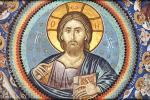 Christ the King Day is a Catholic celebration that takes place on the last Sunday of the liturgical year in the Catholic faith. continue reading
Christ the King Day is a Catholic celebration that takes place on the last Sunday of the liturgical year in the Catholic faith. continue reading
Advent 2023 starts on Sunday December 3, 2023
Advent starts four Sundays before Christmas every year.Immaculate Conception of the Virgin Mary
[holy day of obligation]
Friday December 8, 2023
![Immaculate Conception of the Virgin Mary[holy day of obligation] Image of Immaculate Conception of the Virgin Mary[holy day of obligation]](https://www.catholic.org/files/images/media//14812140994558_150.jpg) Blessed Virgin Mary in the first instance of her conception, by a singular privilege and grace granted by God, in view of the merits of Jesus Christ, ... continue reading
Blessed Virgin Mary in the first instance of her conception, by a singular privilege and grace granted by God, in view of the merits of Jesus Christ, ... continue reading
Advent 2023 ends on Sunday December 24, 2023
Advent ends on Christmas Eve, the day before Christmas, every year.Christmas
Birth of Our Lord Jesus
[holy day of obligation]
Monday December 25, 2023
![ChristmasBirth of Our Lord Jesus[holy day of obligation] Image of ChristmasBirth of Our Lord Jesus[holy day of obligation]](https://www.catholic.org/files/images/media//15226932365_150.jpg) Christmas is an annual festival commemorating the birth of Jesus Christ. continue reading
Christmas is an annual festival commemorating the birth of Jesus Christ. continue reading
The Solemnity of Mary, Mother of God
[holy day of obligation]
Monday January 1, 2023
![The Solemnity of Mary, Mother of God[holy day of obligation] Image of The Solemnity of Mary, Mother of God[holy day of obligation]](https://www.catholic.org/files/images/media/2022/16665677875_150.jpg) The Solemnity of Mary, the Holy Mother of God is a feast day of the Blessed Virgin Mary under the aspect of her motherhood of Jesus Christ. continue reading
The Solemnity of Mary, the Holy Mother of God is a feast day of the Blessed Virgin Mary under the aspect of her motherhood of Jesus Christ. continue reading
Epiphany
Saturday January 6, 2023
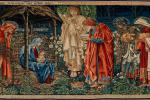 The Epiphany signifies the visitation of the Biblical Magi to the Baby Jesus. continue reading
The Epiphany signifies the visitation of the Biblical Magi to the Baby Jesus. continue reading
Advent Reflections
Reflection for every day of Advent
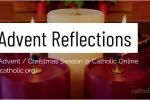 Advent is a period of waiting, like Lent. We are called to obtain the Sacrament of Reconciliation, to pray and fast, as we await the arrival of our ... continue reading
Advent is a period of waiting, like Lent. We are called to obtain the Sacrament of Reconciliation, to pray and fast, as we await the arrival of our ... continue reading
Advent Calendar
Every day of Advent
 An Advent calendar has become a tradition for many families when celebrating Advent and the Christmas season. continue reading
An Advent calendar has become a tradition for many families when celebrating Advent and the Christmas season. continue reading
Advent Candle
24 Days of December
 An Advent candle is a neat way to mark off the days until Christmas. Such candles are commonly found in churches and sometimes in homes. continue reading
An Advent candle is a neat way to mark off the days until Christmas. Such candles are commonly found in churches and sometimes in homes. continue reading
Advent Wreath
Each Sunday of Advent
 The wreath's symbolism of the advent (coming) of Light into the world is clear. The gradual lighting of the four candles, one on each Sunday of the ... continue reading
The wreath's symbolism of the advent (coming) of Light into the world is clear. The gradual lighting of the four candles, one on each Sunday of the ... continue reading
Advent & Christmas Classes
14 Free Classes - Mobile Friendly
 You’re joining our global classroom. Thousands of students from all over the world, each with their own unique story, learn at their own pace on ... continue reading
You’re joining our global classroom. Thousands of students from all over the world, each with their own unique story, learn at their own pace on ... continue reading
Advent & Christmas PDFs
FREE - Printable - Catholic
 Free Advent & Christmas PDFs for anyone, anywhere; Use in your Parish Church - School - Bulletin Inserts. continue reading
Free Advent & Christmas PDFs for anyone, anywhere; Use in your Parish Church - School - Bulletin Inserts. continue reading
Christmas Gifts
Free Shipping $70+
 Make This Christmas Special with Gifts from Catholic Online Shopping. continue reading
Make This Christmas Special with Gifts from Catholic Online Shopping. continue reading
Nativity Scene
Holy Family
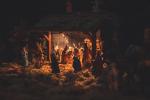 The Nativity Scene is a meaningful expression for our religious faith. With it, we provide a captivating visual focus during the Christmas season. continue reading
The Nativity Scene is a meaningful expression for our religious faith. With it, we provide a captivating visual focus during the Christmas season. continue reading
St. Nicholas
December 6th
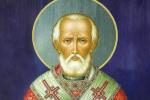 The true story of Santa Claus begins with Saint Nicholas. continue reading
The true story of Santa Claus begins with Saint Nicholas. continue reading
Advent? What is it all about
 The word Advent derives from the Latin word meaning coming. The Lord is coming. We may reflect that every year at this time we celebrate his coming... continue reading
The word Advent derives from the Latin word meaning coming. The Lord is coming. We may reflect that every year at this time we celebrate his coming... continue readingThe Christmas Story
 To become the mother of the Savior, Mary "was enriched by God with gifts appropriate to such a role." The angel Gabriel at the moment of... continue reading
To become the mother of the Savior, Mary "was enriched by God with gifts appropriate to such a role." The angel Gabriel at the moment of... continue readingAdvent Daily Readings
 The weeks of Advent remind us to set aside some of the hectic business of the holiday season, and to quietly reflect on the promise of the baby... continue reading
The weeks of Advent remind us to set aside some of the hectic business of the holiday season, and to quietly reflect on the promise of the baby... continue readingMore Advent & Christmas
ADVENT: A rehearsal for our meeting the Lord

When the Trapp Family Singers came to America it was just before Thanksgiving. Maria Augusta Trapp (Maria in the Sound of Music) noted in ... continue reading
Feast of the Epiphany - A Sunday Letter by Deacon Keith Fournier
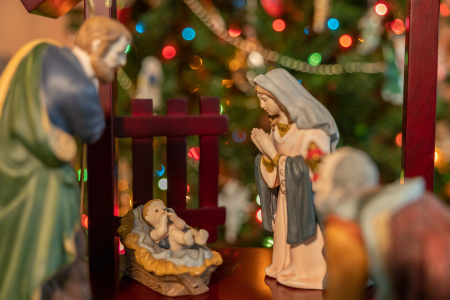
My friends, brothers, and sisters in the Lord,On Sunday January 7, 2024 in the United States and many other Nations, we celebrate the Feast ... continue reading
The Deacon Saint Stephen the Proto-Martyr is a Model for all Christians

In the Catholic Church, Christmas is celebrated for eight days (Octave, from the Latin Octava) and opens up into a wonderful liturgical ... continue reading
Love is Born on Christmas Morn, and the World is Born Anew Watch

The Gospel passages proclaimed at the Vigil and the Midnight Mass of Christmas root the Nativity of the Lord, in the family history and ... continue reading
5 Ways to keep Jesus in your Christmas celebrations this year

Christmas is a magical time of year when decorations line the streets, children are suddenly behaving and the Post Office struggles to keep ... continue reading
Advent Reflection - Day 22- The Fourth Sunday of Advent Watch
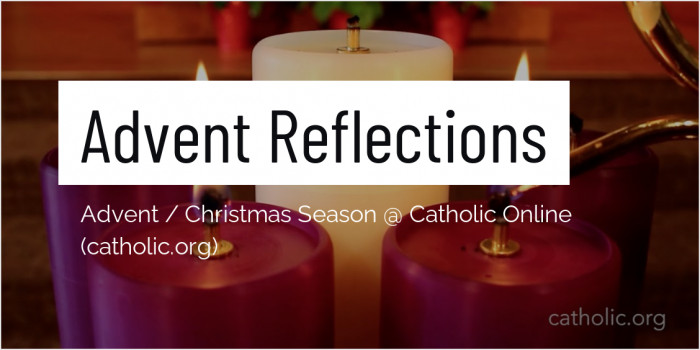
Advent Reflection - Day 22 - The Fourth Sunday of Advent This is the last day of this year's Advent preparations. Tonight, we greet the ... continue reading
Join the Movement
When you sign up below, you don't just join an email list - you're joining an entire movement for Free world class Catholic education.
-

-
Mysteries of the Rosary
-
St. Faustina Kowalska
-
Litany of the Blessed Virgin Mary
-
Saint of the Day for Wednesday, Oct 4th, 2023
-
Popular Saints
-
St. Francis of Assisi
-
Bible
-
Female / Women Saints
-
7 Morning Prayers you need to get your day started with God
-
Litany of the Blessed Virgin Mary
Daily Catholic
 Daily Readings for Wednesday, November 27, 2024
Daily Readings for Wednesday, November 27, 2024 St. James Intercisus: Saint of the Day for Wednesday, November 27, 2024
St. James Intercisus: Saint of the Day for Wednesday, November 27, 2024 Prayer to Saint Anthony of Padua: Prayer of the Day for Wednesday, November 27, 2024
Prayer to Saint Anthony of Padua: Prayer of the Day for Wednesday, November 27, 2024- Daily Readings for Tuesday, November 26, 2024
- St. John Berchmans: Saint of the Day for Tuesday, November 26, 2024
- Act of Entrustment to Mary: Prayer of the Day for Tuesday, November 26, 2024
![]()
Copyright 2024 Catholic Online. All materials contained on this site, whether written, audible or visual are the exclusive property of Catholic Online and are protected under U.S. and International copyright laws, © Copyright 2024 Catholic Online. Any unauthorized use, without prior written consent of Catholic Online is strictly forbidden and prohibited.
Catholic Online is a Project of Your Catholic Voice Foundation, a Not-for-Profit Corporation. Your Catholic Voice Foundation has been granted a recognition of tax exemption under Section 501(c)(3) of the Internal Revenue Code. Federal Tax Identification Number: 81-0596847. Your gift is tax-deductible as allowed by law.



















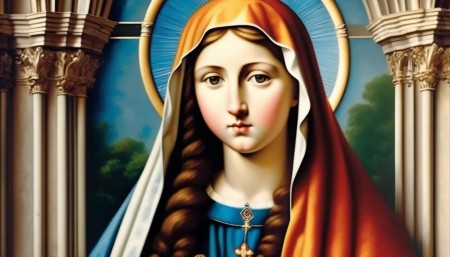
 Daily Readings for Wednesday, November 27, 2024
Daily Readings for Wednesday, November 27, 2024 St. James Intercisus: Saint of the Day for Wednesday, November 27, 2024
St. James Intercisus: Saint of the Day for Wednesday, November 27, 2024 Prayer to Saint Anthony of Padua: Prayer of the Day for Wednesday, November 27, 2024
Prayer to Saint Anthony of Padua: Prayer of the Day for Wednesday, November 27, 2024